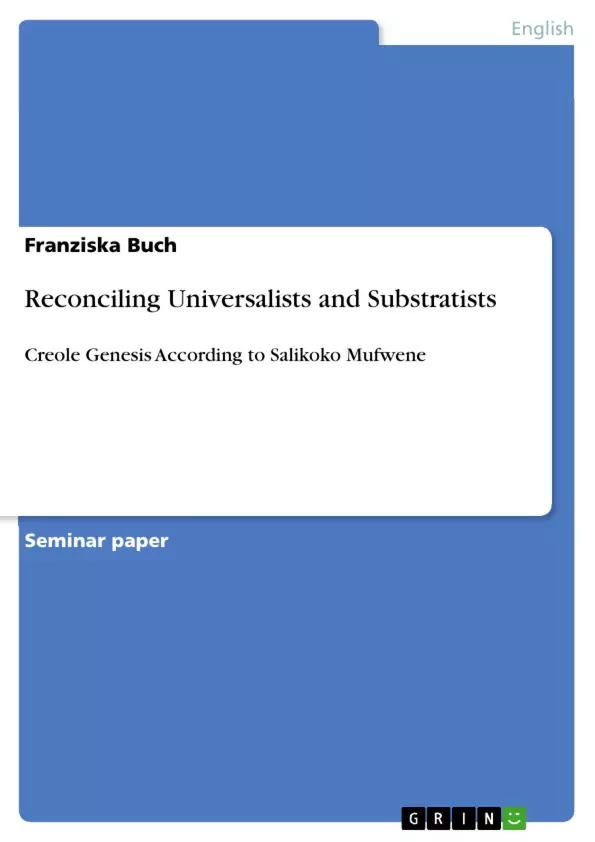By way of an introduction to the following paper, I would like to draw here on a quote
taken from one of Salikoko Mufwene's essays: "...creolists generally agree on the nature of
the sociohistorical contexts which have produced these languages, but they disagree
essentially on the natures of the linguistic processes which resulted in them." (1986:129).
This sentence quite neatly captures what the general pidgin/creole-debate is all about.
The various approaches to pidginization and creolization and on how, i.e. by which
underlying processes, the respective language systems supposedly came into being have
this one thing in common: they all entail, respectively proceed from the assumption in the
first place, that they have something decisive to say about the nature of language in general.
Therefore the different positions are often defended most decidedly, trying, or so it seems,
to lay claim to a final definition of language in one or the other light. As such, I like to
describe this phenomenon as some kind of linguistic-philosophical debate. And this is what
the subject of the following paper shall be about: What are the various approaches, how
convincing are they, i.e., who has the best arguments or is able to disprove opposing views
best? In this sense, the following will be a theoretical rather than practical, case-study
paper. The discussion can be roughly described in terms of two major opposing viewpoints:
the universalist one and a more cognitive-oriented, functional-pragmatic. The latter is
called substratist for the most. The two camps tend to put either more weight on the
structural or the sociohistorical aspect respectively. It is especially the nativization phase,
known as creolization, which interests me most in this paper.
[...]
Inhaltsverzeichnis (Table of Contents)
- Introduction
- X. Setting up the Priorities - Some Miscellanea
- 1. Bickerton's Bioprogram – a Theory and its Opponents
- 1.1 The LBH vs Substrate Theory
- 2. Substrate Theory Reconsidered...
- 2.1 Mufwene and Arguments in Favour….........
- 2.2 Mufwene on the Shortcomings of the Substratist Framework …………………………….
- 2.3 Creolization from an SLA Perspective
- 3. Mufwene and Alliances: a Universal-Substrate Synthesis
- 3.1. Defining Creole Genesis...........
- 3.2 The Role of Universals.
- 3.3 The Nature of Universals..\n
- 4. Concluding Remarks..................\n
Zielsetzung und Themenschwerpunkte (Objectives and Key Themes)
This paper aims to analyze and evaluate the primary theories surrounding pidginization and creolization, specifically focusing on the debate between universalist and substratist approaches. It explores the arguments and evidence presented by prominent scholars like Derek Bickerton and Salikoko Mufwene, examining the strengths and weaknesses of each perspective.
- The role of universal principles in language formation
- The impact of substrate languages on creole development
- The concept of unigenerationality in creole genesis
- The nature of pidginization and creolization as linguistic processes
- The contributions of Second Language Acquisition (SLA) research to understanding creolization
Zusammenfassung der Kapitel (Chapter Summaries)
The introduction provides a brief overview of the pidgin/creole debate, highlighting the central question of the underlying processes involved in language formation. It establishes the focus on two major theoretical perspectives: universalist and substratist. The paper will mainly explore the work of Derek Bickerton and Salikoko Mufwene as representatives of these contrasting views.
The first chapter, "Setting up the Priorities - Some Miscellanea," discusses the simplification hypothesis and Hancock's "African geo-genetic hypothesis," arguing that both ultimately necessitate a universalist or substratist framework for explanation. It lays the groundwork for excluding these approaches from the main analysis.
The second chapter, "Bickerton's Bioprogram – a Theory and its Opponents," delves into the Language Bioprogram Hypothesis (LBH) put forth by Derek Bickerton. This chapter examines the central concepts of unigenerationality, pidginization as SLA, and the role of the language bioprogram in creole formation. It also explores Bickerton's arguments against substratist perspectives and highlights points of contention.
The third chapter, "The LBH vs. Substrate Theory," examines the methodological criticisms of Bickerton's approach, focusing on the work of Jacques Arends. This section contrasts Bickerton's ab ovo approach with a step-by-step perspective, exploring the sociohistorical and demographic factors influencing creole development. It incorporates Mufwene's insights and lays the foundation for integrating substratist elements into a more comprehensive framework.
Schlüsselwörter (Keywords)
The key terms and concepts explored in this text include pidginization, creolization, universalist theory, substratist theory, Language Bioprogram Hypothesis (LBH), unigenerationality, simplification hypothesis, African geo-genetic hypothesis, sociohistorical context, language acquisition, second language acquisition (SLA), and creole genesis.
- Quote paper
- Franziska Buch (Author), 2006, Reconciling Universalists and Substratists, Munich, GRIN Verlag, https://www.hausarbeiten.de/document/118096


